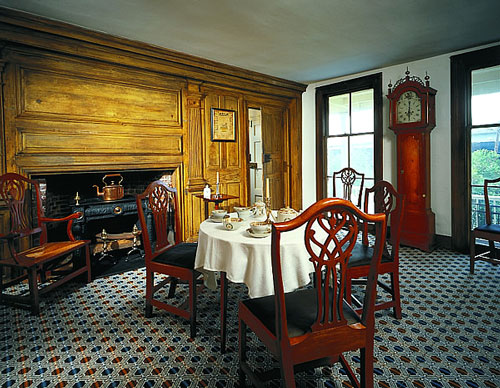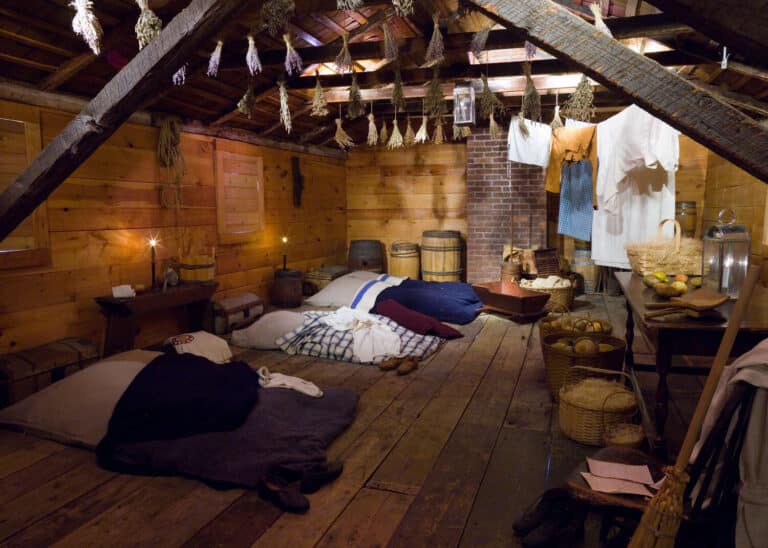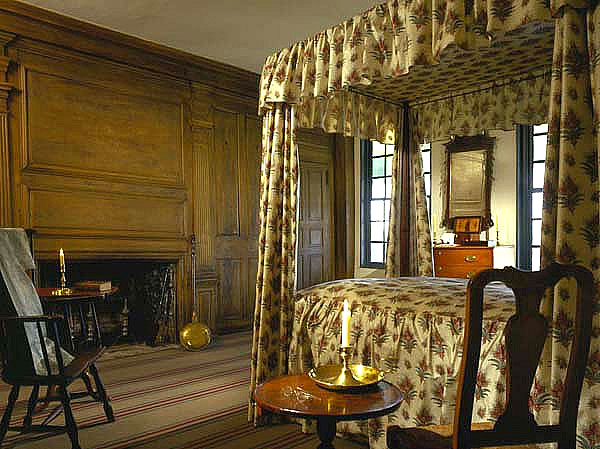New Nation Rooms
The “New Nation,” 1790–1825, refers to the era following the American Revolution when our country was literally a new nation. This was a transitional period for the new states and specifically the Cos Cob household of David Bush and his family.

Parlor Room
The parlor, the most fashionable and public room in the Bush house is furnished to reflect the transitional period between Justus Luke Bush’s marriage to Sally St. John in 1821, and the death of his mother, Sarah Bush, in 1824. Older, eighteenth-century furnishings, representing the styles popular during David and Sarah’s time, are mixed with new furnishings, many bearing neoclassical motifs prevalent during the period of Justus Luke and Sally Bush’s marriage.

Slave Quarters
The attic room above the back kitchen wing of the house was likely used as living quarters for the people enslaved by the Bush family in the eighteenth and nineteenth centuries.

Justus Luke and Sally Bush’s Bedroom
Justus Luke Bush and Sally St. John, second cousins and lifelong acquaintances, married in 1821. Their bedroom, shown here as it may have looked during the early years of their marriage, was their private place, serving an important function in a household whose occupants also included Justus’s mother, two of his sisters and four slaves.
The Bush family underwent a gradual transition from a household of nineteen people, including nine African American slaves in 1790 (1790 Federal Census for Greenwich) to a smaller one of eight that included four free African Americans. Slavery in Greenwich, as in the rest of Connecticut, was strongly rooted in the colonial past. Slave labor was considered to be an essential component of many household and for the Bush household they provided labor in both home and business. In 1784 Connecticut passed the Gradual Emancipation Act, automatically freeing children born to slaves after 1784 when the child reached the age of twenty-five—a later amendment changed the age from twenty-five to twenty-one. As a result of this legislation, the free slave labor was replaced with paid labor, creating an impact on the Bushes finances and lifestyle.
Upon David Bush’s death in 1799, his sons, Justus Luke and Ralph Isaacs inherited the homestead and surrounding lands. Justus Luke Bush became sole heir to David’s mercantile and shipping business after Ralph deeded his half interest in their father’s estate to Justus Luke. In compliance with the Widow’s Third Law, David’s second wife, Sarah Scudder Isaacs Bush, inherited a third of the house, all its furnishing and assumed her role as head of household. Sarah suffered a stroke in 1820 which required a move from the master bedroom upstairs to a smaller room downstairs. A year later, Justus Luke married Sally St. John and brought her into the Bush household. Justus Luke shared control of the household with his mother until her death in 1824.
In the late 1700’s and early 1800’s the “New Nation” was establishing its own banking system. With money now available, sons of farmers and tradesmen could borrow money to start new businesses and industries. The “New Nation” changed an agricultural based economy to an economy based on industry and manufacturing of goods. Justus Luke, having grown up in a wealthy, land-owning family with a business already established, did not immediately adopt the new economy. He saw opportunities in the expanding economy, but the economy was unpredictable. Borrowing money was not without risk. Justus Luke’s business practices required him to borrow large sums of money, placing him in severe debt.
When Justus Luke died in 1844, he had no sons, only an unmarried daughter, Sarah Rebecca. This, combined with the fact that he died during an economic depression, without a will, and deeply in debt, forced his wife, Sally, and daughter to sell the Cos Cob property, thus ending the Bush period of the Bush-Holley House.